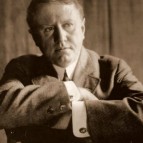
The life of O. Henry (1862–1910), like his much loved short stories, was filled with twists and surprises. Born William Sydney Porter, in Greensboro, North Carolina, in 1862, O. Henry moved to Texas, where he worked as a ranch hand, bank teller, and journalist. In 1896 he was indicted for and convicted of embezzling funds from an Austin bank, and he spent three years in prison. Prison turned out to be a blessing in disguise. While incarcerated, Porter started to write short stories, using the pseudonym by which he later became famous. Released from prison in 1901, the author moved to New York, where he spent the last ten years of his life, and his newly adopted city became the setting and inspiration for many of his short stories.
O. Henry
Like Mark Twain, the popular American short story writer O. Henry (William Sydney Porter, 1862–1910) often took a humorous, not to say irreverent, approach to subjects generally not treated lightly. This story describes a celebration of the Fourth of July by a small group of Americans living in Salvador. It includes O. Henry’s trademark: a surprise ending.
O. Henry
Maintaining traditions in America is neither easy nor always welcome. Times change. Rituals ossify. Their meanings become obscured. For those who are down and out or who live alone, even our most beloved holidays can be depressing. More deeply, upholding traditions may be at odds with our devotion to progress or self-interest. These issues are humorously but powerfully exposed in this short story (1905) by O. Henry.

